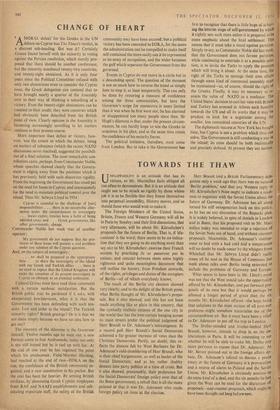CHANGE OF HEART
6 A MORAL defeat' for the Greeks in the UN debate on Cyprus was The Times's verdict, in a discreet sub-heading. But was it? Certainly Greece found herself with the minority in voting against the Persian resolution, which merely pro- posed that there should be another conference; b it the minority numbered twenty-two countries, a id twenty-eight abstained. As it is only four years since the Political Committee refused with only two abstentions even to consider the Cyprus issue, the Greek delegation can contend that to have brought nearly a quarter of the Assembly over to their way of thinking is something of a victory. Even the twenty-eight abstentions can be counted to their credit; they were countries which had obviously been detached from the British p >int of view. Clearly opinion in the Assembly is becoming increasingly' unwilling to let matters - zontinue in their present course.
More important than defeat or victory, how- ever, was the extent to which the debate, being on matters of substance (which the recent NATO discussions never reached), suggested the possibili- ties of a final solution. The most remarkable con- tribution came, perhaps, from Commander Noble, whose speeches showed clearly that the Govern- ment is edging away from the positions which it has previously held with such disastrous rigidity. From the beginning the Government has stood pat on the need for bases in Cyprus; and consequently for the need to maintain political control over the island. Thus Mr. Selwyn Lloyd in 1954: • Cyprus is essential to the discharge of [our] responsibilities . . . there is no acceptable alter- native under the circumstances to sovereignty . . . leases expire, treaties have a habit of being whittled away, and . . . Greek governments, like other governments, change.
Commander Noble last week was of another opinion: My government do not suppose that the pro- vision of these bases will present a real problem under any solution of the Cyprus question.
And, on the subject of sovereignty : . . . we shall be prepared at the appropriate time . . . to share the sovereignty of the island with our Greek and Turkish allies . . there is no need to expect that the United Kingdom will make the retention of its present sovereignty in Cyprus an obstacle to an eventual settlement.
Colonel Grivas must have read these comment will a certain sardonic satisfaction. But the British public may be pardoned if it asks, with exasperated bewilderment, what it is that the Government has been defending with such ten- acity. Law and order in the island? The Turkish minority rights? British prestige? Or is it that we are there simply because we have no idea how to get out?
The measure of the dilemma is the Governor himself. Twelve months ago he went out, a new Perseus come to free Andromeda; today not only is she still bound but he is tied up with her. At ' the end of one year he has regained the point which his predecessor, Field-Marshal Harding, had reached at the end of two—EOK A on the run, the confidence of the British community re- gained, and a new constitution in his pocket. But the cost has been far heavier. By arming British civilians, by dismissing Greek Cypriot employees from RAF and NAAFI establishments and sub- stituting expatriate staff, the safety of the British community may have been secured; but a political victory has been conceded to EOKA, for the more the administration can be compelled to make itself self-contained the more easily can it be represented as an army of occupation, and the wider becomes the gulf which separates the Government from the governed.
Events in Cyprus do not move in a circle but in a descending spiral. The question of the moment is not so much how to reverse the trend as simply how to stop it, at least temporarily. This can only be done by restoring a measure of confidence among the three communities, but here the Governor's scope for manoeuvre is more limited than it was when he first went out; he has alarmed or disappointed too many people since then. Sir Hugh's dilemma is that, under the present circum- stances, he can hardly hope to win the Greeks to acquiesce in his plan, and at the same time retain the confidence of his security forces.
The political initiative, therefore, must come from London. But to take it the Government has first to recognise that there is little hope of ach iev- ing the interim stage of self-government by which it rightly sets such store unless it is prepared to be more emphatic about the final settlement. Thi9 means that it must take a stand against partition. Simply to say, as Commander Noble did last week, that the Government does not favour partition, while continuing to entertain it as a possible solu- tion, is to invite the Turks to apply the pressure which will bring it about. At the same time, the right a the Turks to manage their own albite through some kind of communal assembly nlust be maintained—as, of course, should the right of the Greeks. Finally, it may be necessary to re- assess the value of NATO as a mediator. The United States' decision to cast her vote with Bri ale and Turkey has aroused in Athens such host litY towards the US and all its works that it may be prudent to look for a negotiator among the smaller, less committed countries of the UN.
The diplomatic success at New York has bot time, but Cyprus is not a problem which time solve. The Government is still conducting a wa the island; its aims should be both realistic and precisely defined. At present they are neit ght an r in ily cr.






































 Previous page
Previous page